- Home
- Joy Dettman
The Tying of Threads
The Tying of Threads Read online
About The Tying of Threads
In the final instalment of Joy Dettman’s beloved Woody Creek series, we return to the small timber town where it all began . . .
GEORGIE: Independent and spirited, Georgie is her mother’s daughter through and through. But after a house fire both takes the life of her sister, Margot, and burns her home to the ground, Georgie is lost. She flees town with nothing but a cardboard box and the determination to be somebody, anybody, else.
CARA: After almost losing her adopted daughter, Cara’s view of the world has radically shifted. She’s decided that life is to be lived and love is to be cherished, even when that means crossing boundaries she’d never dreamed of. But is any love great enough to overcome an unimaginable burden of guilt and shame?
JENNY: With her nest empty Jenny is more lonely than ever. Rattling around her big old house with too much time to think, she’s left to wonder: should her secrets stay buried forever or will revealing the truth set her free?
As the new millennium draws ever closer and Woody Creek struggles to survive, one thing becomes clear – in order to face their futures, Jenny and her daughters must first make peace with their pasts.
If it’s not too late . . .
CONTENTS
Cover
About The Tying of Threads
Dedication
Woody Creek Characters, Past and Present
Family Tree
Part One
The Storm
Lila
The Double Dare
Missing
Tombstones
Odd Couples
Rest in Peace
Shock Therapy
A Forgiving Soul
The Balcony
Nose Job
The Party
The Hair
Fog
The Cast Iron Frying Pan
Alice in Wonderland
Time
A Very Bad Year
Tobacco Smoke
More Than She Can Chew
The Ring
What Will Be Will Be
Jim’s Obsession
The Dog Affair
Potato Friendship
Part Two
Greensborough
The Meltdown
A Dog’s Life
Lacy Hopkins
Funerals
Hate
The Commission House
Fame
Good Dog
The Fire God
God is Kind
The Manuscript
Sent in Chains
A Wrong Year
The Silencing of Screams
Part Three
Communication
The Sewing Room
Sanctuary
The Unforgiven
The Final Year
The Lady in Pink
A Match Made in Heaven
The Handshake
About Joy Dettman
Also by Joy Dettman
Copyright page
For Joan, sister poet of that dark old bedroom
and
for Lois, sister dependable, who pleaded with us to
shut up and get to sleep
WOODY CREEK
CHARACTERS ,
PAST AND PRESENT
Jenny, born of a brief relationship between Archie Foote, the philandering husband of Gertrude, and Juliana Conti, a foreign woman who died in childbirth, was raised as the daughter of mad Amber and pompous Norman Morrison. Her early life was chaotic.
Margot, first born of Jenny’s three daughters, dies in a house fire in 1977, and if not for fate and a fallen fence, Georgie, Jenny’s second born daughter, would have burnt with her. Georgie escaped with her life and little else, and has since escaped Woody Creek.
Cara, Jenny’s third daughter, given at birth to Myrtle and Robert Norris, was drawn back to that town on the night of the fire. She has since disappeared with her two children.
Jimmy, only son of Jenny and Jim Hooper, claimed as a six year old by his grandfather, Vern, and later adopted by Margaret Grenville-Langdon (née Hooper), took his adopted English father’s name and is now known as Morrison (Morrie) Grenville-Langdon.
FAMILY TREE
PART ONE
THE STORM
The good seasons and the bad came in cycles to Woody Creek, the rich years when the rains came as required, when the crops grew tall, the sheep grew fat and the cows gave cream-rich milk. Then there were those other years when too much rain fell and the creek escaped its banks to spread for miles across low-lying land. A cow would swim, sheep drowned and crops turned to slime beneath mud-brown lakes.
The red gum forests surrounding Woody Creek celebrated the flood years, their roots drinking deep enough to sustain them through the droughts when passing clouds refused to give up their rain, and the crops wilted, and the cows grew gaunt and sheep lay down to die in dustbowl paddocks.
The bad heat had always come in cycles, that baking, blast furnace forty-degree heat that sucked the sweat and breath from Woody Creek, those days when children followed the shade and old men who had no more sweat to shed eyed the cemetery as friend not foe.
The town fathers had chosen land too close to town when they’d planted their first crop of the dead. Woody Creek had grown around it – and for reasons known only to those who lived there, was still growing.
A mill town, Woody Creek. Thirty years ago there’d been five sawmills in town and the bush mill; no man capable of labour was out of a job. By ’78 only two mills were still cutting, Macdonald’s and Davies’, and unemployment figures were high.
Land was cheap there, and so it ought to be. Woody Creek had no rolling hills, no nearby ocean, no lake. It had a corner pub, a scattering of shops, acres of red gum forest – and the creek. It had Willama too, a large inland city a half-hour drive to the north-east, where a small building block two miles from the Willama post office might set you back four times what you’d pay for a good-sized block behind Woody Creek’s cemetery, or down near the old slaughteryards where a bowling club was currently under construction. Its lawns would no doubt appreciate the blood and bone of generations of cow, pig and sheep.
By ’78, the local butcher no longer slaughtered local cattle on local land. By ’78, much of the meat eaten in Woody Creek arrived in town pleasantly presented on supermarket trays.
The council had built a swimming pool on the corner of Cemetery Road and Slaughter Yard Lane. Kids who used to cool off in the creek behind Dobson’s and McPherson’s land now congregated at the pool where their massed screams competed with Macdonald’s screaming mill saws.
Back after the first war, old George Macdonald had built that mill on the outskirts of Woody Creek but, like the cemetery, the town had surrounded it. Its saws were silent during the week between Christmas and New Year and the silence was deafening, though not this year. Fire truck sirens had bellowed through the town that week.
Forest fires travelled hand in hand with those red north winds of drought years and there was not a lot a man could do to fight them. For a time it had looked as if Woody Creek might go up in smoke, but the wind had turned and sent that fire back on itself.
‘God’s hand was in it,’ the old folk said.
‘Why did he start it in the first place then?’ the kids asked. Their generation wouldn’t waste their Sundays in church. They’d marry there. They’d attend burial services there.
There were two funerals at the Anglican church today, old Pop Dobson’s and Margot Morrison’s.
‘It’s such a bad day for it,’ Maisy Macdonald said. ‘It reminds me of when we buried old Cecelia Morrison. The temperature peaked at a hundred and fifteen that day.’
‘You would have all been dead, Nan,’ her twelve ye
ar old grandson said. ‘You would have been sizzling like bacon if it ever got that hot.’
Kids today knew so much more than their grandparents would ever know – and they knew so much less. They’d never heard of Fahrenheit, but knew that the forty-four degrees Celsius promised by the television weather man last night made it too hot to go outside.
Jenny had parked the car in the shed, for its shade, not the car’s protection. It was a write-off, the insurance company said. Jim had ordered a new car, and been waiting for days for a call to pick it up.
She backed it out to Hooper Street, named for Jim’s family; they’d built on that corner before the street had a name. Once again she looked for Georgie’s red ute. She’d been looking for it all morning – listening for it for days.
She expected to see the ute parked out front of the church. No red ute. Only four cars there – and the undertaker’s car and the hearse – and Margot’s funeral was due to start at one thirty and Jenny needed Georgie at her side today.
Five days since she’d had her stitches removed – and Jenny had to phone the hospital to find out that much. Not one word from Georgie.
‘She’s not coming,’ she said.
‘She’s an adult, Jen, and we need to get in there,’ Jim said.
An old red-brick building, the church stood on the corner of South and Church streets, and today, surrounded by dead lawn, it looked abandoned. Little Jenny Morrison had sat at Norman’s side on its hard pews each Sunday of her childhood. These days she entered that door only for funerals.
They were close to its shade when another fire truck bellowed through town.
‘Something’s burning again,’ she said.
‘It’s the day for it,’ Jim said, stilling his feet to listen. By the sound of it, it was heading towards the bridge, to the west of town. There wasn’t a lot left to burn out that way.
An atrocious day for a funeral. It would have been worse had the church been crowded. No crowd there to say goodbye to Margot Macdonald Morrison. Few had known her, fewer had sighted her these past ten years.
Elsie and Harry Hall were there with their sons. Teddy and Lenny Hall would carry the coffin. Maisy Macdonald was there with four of her eight daughters and two adult grandsons, also pallbearers. John and Amy McPherson, Robert Fulton, his elderly mother and Miss Blunt. Jenny nodded to them as she walked by to the front-row pew.
The minister, sweating in his vestments, didn’t waste time.
For two days Jenny had attempted to write something meaningful for him to say about Margot. All she’d come up with was how she’d loved to win when they’d played cards and how two little girls had slept side by side as babies and how they’d lived together in Granny’s house.
She’d made no mention of Trudy. In life, Margot had denied giving birth to her and few in this town knew she had. Elsie and Harry and their kids knew, and Georgie – and where was she?
Again Jenny glanced over her shoulder, half-expecting to see Georgie standing in the doorway. Only the undertaker, sweating in his dark suit.
Georgie had lost everything that night. She’d damn near lost her life. If Harry and Elsie hadn’t known which room she’d slept in and if Raelene hadn’t knocked down the chicken wire fence, the police couldn’t have got near that window to break it and drag Georgie out.
There was nothing left of Granny’s house. Not a stick of a wall. Not the shape of a door. The chimneys and the kitchen stove, accustomed to heat, had survived the inferno and that was all.
Jenny forced her mind back to the coffin. She’d chosen a white coffin. As a twelve or thirteen year old, Margot had developed a germ fetish and become obsessed by white. She’d only wear white underwear, white frocks, white anklet socks to keep her feet germ free – until she’d grown too heavy to reach her feet and pull her white socks on.
The coffin looked so small, like a kid’s. She’d asked for white flowers only. At the time it had seemed like the right thing to do. Today, it looked wrong, but everything she’d ever done for that girl had been wrong. I should have let her win that last card game—
‘. . . when fire destroyed that grand old heritage home, built by Woody Creek’s founding father Richard Hooper.’
Jenny stared at the minister. He hadn’t got that from her notes, not the ‘founding father’, his name, or the ‘heritage’ bit. She looked at Jim, who was looking at her, each face answering the other’s unspoken question, then both glancing in Maisy’s direction. She was Margot’s grandmother and she liked to talk.
She’d spoken to the Willama Gazette.
For days Woody Creek had been headline news in the local and city papers, and on television.
WOMAN DRAGGED FROM INFERNO WHILE SISTER BURNS
TWELVE MEN AND FIVE WOMEN ARRESTED IN DRUG BUST
Three women and nine men had been charged. Most had been released on bail. On the night of the drug bust there must have been forty men, women and kids living out at Monk’s hippy commune. All bar a dozen had moved on.
KIDNAPPED INFANT FOUND ALIVE
SECOND VICTIM FOUND IN THE ASHES
‘Our prayers are with Margot’s family and her greatly loved neighbour Elsie,’ the minister said, his words jarring every nerve ending in Jenny’s body.
Elsie, a loved neighbour? Elsie was the only one crying for her and the only one likely to cry. She’d been a mother to Margot, and Jenny had told that minister to say so. Her greatly loved neighbour? It was worse than meaningless. It was insulting; it was embarrassing, and Jenny cringed in preparation for what the minister might say about Margot’s grandmother, who didn’t look as if she’d hear what he said anyway. She looked ready to pass out. There was much too much of Maisy, ten or twelve stone too much, and she must have been eighty.
Jenny’s fingers counted the years. She knew that Maisy had been ten months older than Amber, that Amber had been . . .
And everyone was standing for a final prayer. Jenny stood, having decided that if Amber was still alive somewhere she’d be seventy-nine turning eighty this year.
I hope they take her home, Jenny thought as Maisy struggled to her feet. I hope they don’t take her out to the cemetery. The heat will kill her.
It didn’t seem real that Margot was in that coffin. Jim was nudging her to follow. They’d been seated on the chief mourners’ pew but Jenny didn’t feel like the chief mourner so remained where she was, giving way to Elsie and Harry, then to Maisy and her daughters.
She took Jessica Palmer’s arm before they stepped out into the sun. ‘Don’t take your mum out to the cemetery, Jess,’ she said.
‘She’s determined to go,’ Jessica, youngest daughter to Maisy, said. ‘Georgie didn’t get back for it?’
‘Other than the note she left on the kitchen table when she left, I haven’t heard a word from her,’ Jenny said.
Handkerchiefs wetted beneath the church’s garden tap dried fast at the cemetery. Umbrellas and wide-brimmed hats offering the only shade, the minister got it done at breakneck speed, then Maisy did as she always did, invited the mourners back to her house for a cup of tea.
She was Margot’s grandmother by default, or by the fault of her raping mongrel twin sons. She’d told Jenny yesterday that they’d agreed to close their mill down for the day. They hadn’t, and had those mill saws not been screaming, Jenny wouldn’t have agreed to go to Maisy’s for a cup of tea. Macka and Bernie Macdonald had never moved out of their mother’s house.
‘Do we have to?’ Jim asked.
‘She’ll stand around in the sun talking if we don’t,’ Jenny said.
*
Entering Maisy’s passage was like walking from Hades into an icebox. She owned two big air conditioners, both turned on since morning. As a kid Jenny had loved this house. As a kid, she’d loved Maisy, who’d been more mother to her and Sissy than Amber had ever been.
She drank her tea, ate a slice of Maisy’s lemon meringue pie, and mentally composed the letter she had to write to Florence Keating which needed to be in
the post by four or it wouldn’t get to Queensland in time. If it didn’t, Jenny would have to phone that woman, and she was in no mood for a monologue of Florence’s guilt; she had enough of her own.
Raelene, also killed in the fire, was being buried next Thursday, not the little Raelie who for seven years had been Jenny’s doll-like daughter, but the one Florence Keating and her husband had ruined.
They’d read about Ray’s death in the newspaper and got themselves a lawyer to fight for custody of the then seven year old Raelene. Florence had given birth to her and at the time she and her husband had no children.
Jenny, aware that her life wouldn’t stand up to a court’s scrutiny, hadn’t fought for that little girl.
She’d fought to get control of the twelve year old brat Florence had handed back to her, and if Dino Collins hadn’t come on the scene with his drugs she might have had a chance. Lost the battle when Raelene started shooting drugs up her arms. Given up. Lost touch with her – until the night Granny’s house had burnt when she’d learned that Raelene had given birth to a baby which had somehow ended up in Cara’s care. How and why Cara had become involved Jenny didn’t know.
She’d never known a lot about Cara. She must have married. She had a son – and the newspapers referred to her as Cara Grenville, foster mother of the kidnapped infant. Raelene and Dino Collins had taken tiny Tracy from her bed, drugged her and taped her into a cardboard carton, and if not for Joe Flanagan’s red kelpies, Tracy would have died taped inside that carton.
For days the newspapers and television followed the story – and drove Jenny crazy, but it had been those television cameras which allowed her to see her grandson.
One caught him leaving the children’s hospital, a six or seven year old boy, holding on to Cara’s hand while looking back at the cameraman – and he might have been Jenny’s own son, Jimmy, if not for his spring-coil golden hair, Jenny’s hair, Cara’s hair, Archie Foote’s hair.
‘Ready?’ Jim asked.
‘The car will be like an oven,’ Jenny said.
She kissed Maisy, kissed Elsie, accepted kisses from two of Maisy’s daughters, then went out to force open the driver’s side door of their abused Ford – and to borrow Jim’s handkerchief to protect her hands from its red-hot steering wheel.

 The Hope Flower
The Hope Flower Trails in the Dust
Trails in the Dust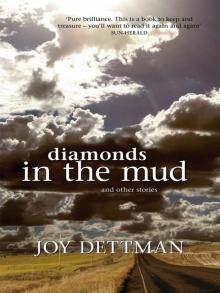 Diamonds in the Mud and Other Stories
Diamonds in the Mud and Other Stories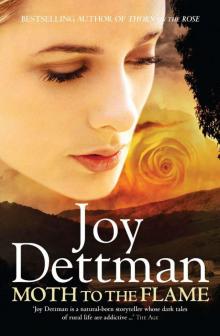 Moth to the Flame
Moth to the Flame The Tying of Threads
The Tying of Threads Wind in the Wires
Wind in the Wires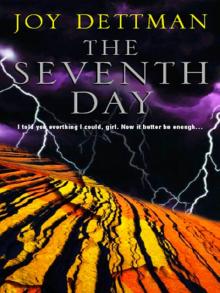 The Seventh Day
The Seventh Day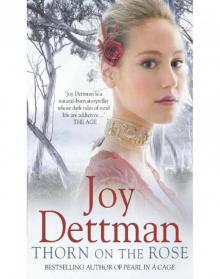 Thorn on the Rose
Thorn on the Rose Jacaranda Blue
Jacaranda Blue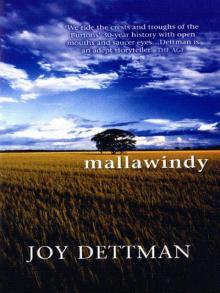 Mallawindy
Mallawindy Ripples on a Pond
Ripples on a Pond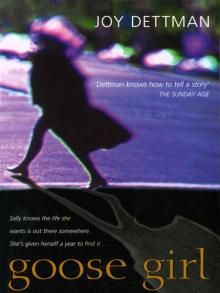 Goose Girl
Goose Girl The Silent Inheritance
The Silent Inheritance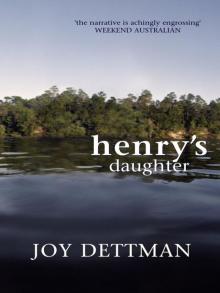 Henry’s Daughter
Henry’s Daughter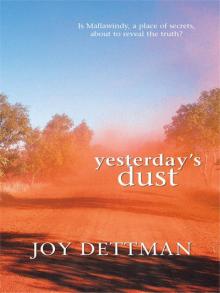 Yesterday's Dust
Yesterday's Dust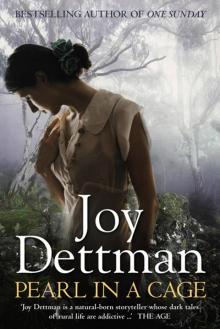 Pearl in a Cage
Pearl in a Cage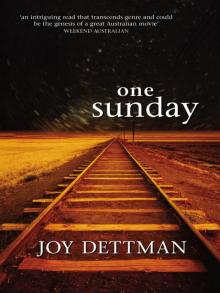 One Sunday
One Sunday